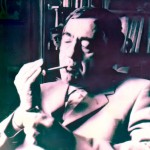Poetry in Translation (CCXIX): Vasko POPA (1922-1991), SERBIAN -VLACH, Poet of Serbo-Croat Expression, “Soare Orb”, “Blind Sun”
Soare Orb
Vasko Popa
(1922, Grebenaţ, Voivodina, Serbia – 1991, Belgrad, Serbia),
(Poet Vlah de expresie Serbo-Croată)
Două raze oloage
Poartă soarele orb.
Dimineaţa s-a dus la muncă
Pe cealaltă coastă a cerului.
Nu stă în pragul ei.
Amiaza a decăzut.
Benchetuieşte cu fulgerele.
Nu-i niciodată acasă.
Seara, s-a dus în lume
Cu patu-n cârcă.
Cerşeşte pe-un astru.
Numai Noaptea a ieşit
Cu braţele deschise
In întâmpinarea soarelui orb.
Source – “Adelydda”:
http://www.versuri-si-creatii.ro/poezii/p/vasko-popa-6zutuct/soare-orb-6zucuct.html#.Undn2iTyuCl
Blind Sun
(Vasko POPA)
(1922 – 1991)
(Romanian-Vlach Poet
of Serbo-Croat expression)
Two blighted legs
Holding a blind Sun.
The morning rays – gone to work
On the other side of the sky,
Rather than its threshold.
The Noon is beyond the Pale.
Cavorting with thunders,
She’s never at home.
The evening takes to the road,
The bedstead on her back,
She’s begging on some constellation.
Only the Night appears,
With outstretched arms,
To welcome a blind Sun.
Rendered in English by
Constantin ROMAN, London,
© 2013, Copyright Constantin ROMAN
Vasko Popa (1922 – 1991) was a Serbian poet, (of Vlach descent*), born in Vršac. Ted Hughes, who did not speak Serbo-Croat, first came to read Popa’s poetry in English translation in 1964 and was immediately impressed. Hughes never attempted to translate Popa but was always a great supporter of his work, including a selection of his poems in the very first issue of Modern Poetry in Translation in 1965. Four years later, Hughes wrote his ‘Introduction’ to Popa’s Selected Poems, a piece of criticism which tells one as much, if not more, about Hughes as it does about Popa.
In this introduction, Hughes seems particularly taken by what he calls Popa’s ‘folk-tale surrealism,’ and the way that Popa combines a strangeness of imagery with familiar, down-to-earth observations. Hughes also notes Popa’s successful use of certain devices, such as ‘the little fable of visionary anecdote’, and a tendency to write in cycles, and there is much evidence of the influence that these aspects of Popa’s poetry may have had on Hughes’s own writing, especially in collections such as Crow and Gaudete.
(Text credit: http://www.thetedhughessociety.org/news.htm
‘Vasko Popa’ in: ‘The Ted Hughes Society Journal’,
by Tara Bergin (PhD Student at Newcastle University)
*) Editor’s note





No Comments so far ↓
Like gas stations in rural Texas after 10 pm, comments are closed.